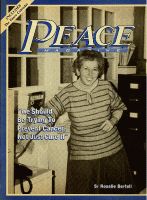
Peace Magazine May 1985, page 7. Some rights reserved.
Search for other articles by Robert Penner here
VANCOUVER --- The plans for the formation of a national alliance of peace groups took a significant step forward at a planning meeting here March 15-17.
Delegates representing 36 peace organizations from across Canada agreed unanimously to call a founding convention for the new alliance for this fall.
According to the wording of one of several resolutions the delegates agreed to meet again to "approve a draft basis of unity for a new Canadian peace alliance." Such a basis of unity would be "circulated and discussed as widely as possible." A final draft will be synthesized and presented "for discussion and ratification at a cross-Canada convention in Toronto on November 8, 9, and 10."
Present to pass the above resolution were delegates from every province in Canada with the exception of the Maritimes. The east coast did not go unrepresented, however. Sally Davis brought reports from a newly-formed Newfoundland coalition of peace groups and from the Prince Edward Island Peace Committee. Eleven national peace organizations were also represented at the Vancouver meetings as was the Canadian Labour Congress and two of the major union centrals in Québec -- the C~N and CEO)
It was unanimously agreed (with one abstention) that the purpose of the new alliance would be:
I) Networking;
2) Sharing information;
3) Discussion of ideas and issues in a national forum; and
4) facilitating opportunities for action between groups.
There was considerable discussion on what relationship such a new formation would have with existing peace structures .
The discussion made clear the desire for more coordination, but not if it required the imposition of an elaborate hierarchy.
Most delegates seemed to favour a minimal structure but a formal one nonetheless. A few groups suggested that the new alliance should play a facilitating role rather than organizing and co-ordinating its own activities. However, a motion that the new body should be "working towards developing the group's mandate to be able to initiate or endorse campaigns, or undertake actions in its own name" was passed 21-6, with 5 abstentions.
Several suggestions were made as to the initial mandate of a new coalition. The End the Arms Race (EAR) coalition proposed that the new body begin by providing a regular "clearing house function" by circulating unedited materials, information and calls to action. The Ottawa Disarmament Coalition suggested that an education program (called a "peace literacy campaign") might be undertaken. The Coalition Québecois pour le desarmement et la paix (CQDP) suggested that the major function of an ongoing structure would be to organize an annual consultative conference of peace activists. The World Federalists proposed that a new coalition should "encourage the development of riding committees to put pressure on MPs at the constituency level."
The delegates in Vancouver also agreed to an ongoing planning process. The planning committee will meet again at least once before the convention. An Organizing Committee of six regional organizations and four national organizations was selected to make the decisions necessary in the interim.
Discussion also took place on the representation arrangements for delegates to the founding convention. It was agreed that further discussion was needed, and that the Organizing Commit tee should study the issue and bring a resolution before the next planning meeting.
The meeting did provide some initial terms of reference on this question. It was agreed that a 2/ 3 majority is required for decisions at the convention and that, while attendance at the convention will be open, organizers will aim for a goal of approximately 250 voting delegates. The delegates should be selected from representative sections "comprised of geographical groups and organizations involved in peace and disarmament work, and that political parties be excluded."
The meeting also addressed questions of membership. It was agreed that the new structure will not have any individual members, remaining instead an alliance of groups rather than individuals.
The meeting agreed unanimously (with two abstentions) to accept a $25,000 grant from the External Affairs' Department of Arms Control and Disarmament. Contrary to some reports, the grant contains only the stipulations that the funds not be used for staff and office costs and that an accounting of the funds used be provided.
Overall, the meeting accomplished the major tasks necessary for the project to proceed. Perhaps surprisingly the Vancouver meeting was the first time that many of the delegates had met one another.